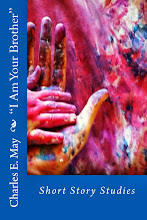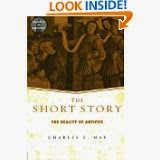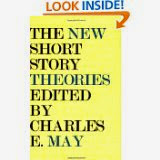The British are more generous giving awards for short stories than the
Americans. The only American short story
award of significant value is The Story Prize, established in 2004, which
awards a stipend of $20,00 for the best collection published in the U.S. The Story
Prize has been awarded to such writers as Edwidge Danticat, Mary Gordon, Tobias
Wolff, Anthony Doerr, Steven Millhauser, and George Saunders.
England has the Sunday Times EFG Short Story Award (£30,000),
the BBC National Short Story Award £15,000),
The Commonwealth Short Story Prize
(£5,000, The Fish Short Story Prize (€3,000). And these generous prizes are for a single short story,
not a collection of stories.
Philip Hensher has
complained about the British emphasis on contests in his Introduction to the
two-volume set he edited, The Penguin
Book of the British Short Story. Hensher says that he attended the Sunday Times award dinner a few years
ago and watched the judges hand over the £30,000 check for an "utterly
routine piece of work by an American author about a tragically dead rock star
and a terminal illness." (That would be 2014, when Adam Johnson won the
prize for his story about Kurt Cobain, "Nirvana," from his collection
Fortune Smiles). I agree with Hensher's opinion of that story,
but hell, they gave it the year before for the rambling, coarse, simplistic
piece, "Miss Lora," by Junot Diaz, and the year before that for the
entertaining, but certainly not great, "Beer Trip to Llandudno" by
Kevin Barry. But never mind; that's one of the contentions of contests—who does
the judging.
Hensher argues that
with the same money the Times awards
each year for one story, they could publish a story every week for £1,000 each. Similarly, he says the BBC's annual short
story competition prefers handing out a single big check each year to paying
writers properly to write for regular broadcast. Hensher complains, rightly,
that there are very few publishing outlets in England willing or able to pay sufficiently
for short stories to encourage writers to write them. This seems to be
improving in England, perhaps largely due to the rise of interest in university
creative writing programs there, but despite the popularity of such programs in
America, short-story writers still get short shrift here.
I have to admit that
after Junot Diaz and Adam Johnson won the big EFG Awards, I lost interest in
subsequent winners. But this year, I decided to take another look at the most
recent winner of the biggest prize.
The winner of the
2015 Commonwealth Short Story Prize
was Jonathan Tel's "The Human Phonograph." AND the winner of the 2016 Sunday Times EFG Award was also Jonathan Tel's "The Human
Phonograph." Can that be right?
That's £45,000, or at today's exchange rates, is, correct me if I'm
wrong, $58,268.00. Can a single short
story be that good? And if so, what makes it so good?
"The Human
Phonograph" takes place on a nuclear base in Qinghai province in northwest
China in 1969, the year Neil Armstrong walked on the moon. The central characters are a married couple separated
for seven years, having been married for only nine months when the government sent
the geologist husband to this base and left the wife alone in Beijing. The
story begins with the wife being told by the government that she will be
allowed to join her husband.
So at the outset,
what the story has in its favor is an exotic, even top secret, locale and the important
historical context of Mao's quest for the Bomb and America's conquest of
space. However, perhaps more important
is that within this geographical and historical context, there may be a significant
generic context: "The Human Phonograph" is first and foremost a love
story.
A love story usually
must be delicately told, with some restraint, and have a lyrical framework, or
it will lapse into sentimentality or comedy. There must also be some impediment
to the fulfillment of the love/passion that drives the story, e.g. an illness,
another spouse, warring families, racial difference, social disapproval, etc. And
usually, a love story ends in the death of one, or both, of the lovers.
Tel announces the
love story theme in the first few lines of his story, placing it within the
combination of the romantic and the scientific context of the moon landing,
which is so unreal, yet so utterly real at once--a scientific encounter with
one of the most romantic of all images. The story opens this way:
"And as a figure in
reflective helmet and articulate suit half-walks half floats over the unreal
surface she make-believes he is her husband and the moon itself could perfectly
well be Quinghai province for all anybody can tell…and she shades her eyes with
her hands so nobody can see her cry.
It has been seven years.
There are thoughts that
cannot be spoken but can only be sung."
With this line about thoughts that have to be sung, Tel prepares the
reader for the titular metaphor of the human phonograph. One of the judges, British writer Rose
Tremain, who says the decision of the judges was unanimous about this story,
calls it a "troubling, well-wrought story," but that that what
"elevates it to something truly memorable" is the image of the
title—"of a man, who, in a silent, punitive and desolate world, can
remember the old songs and sing them perfectly every time."—which
suggests, as is often the case for the short story, it is the metaphor that
makes the story.
The historical context is presented early on, with information about
China's first atomic bomb test in October, 1964, after Mao broke with Stalin,
even mentioning an actual photograph (available online) of about 20 dark
figures (faces not visible) with their left arms raised high, facing a mushroom-shaped
cloud that looms in the background. The narrator says the husband is the third
scientist from the left, and notes that the photograph was obviously posed, for
no one could have actually been that close to the blast.
The story begins in July, 1969 as the wife makes an eight-day journey
to a secret location in the northwest of China and sees her husband for the
first time in seven years. They meet formally, she greeting him with the
salutation "Comrade"—which has both personal and political
significance. When they have sex, she thinks of herself in terms of the terrain
of the province Quinghai, as her husband, a geologist, "sets out on an
exploratory trip. He examines her,
investigates her, takes a core sample…and as Quinghai thrashes and screams, she
is a tiny figure within the province of herself." But in her mind, she is cast back to Beijing,
seeing the city in an ecstatic vision, distorted: "Instead of a flat
street with cyclists, there is a broad highway lifted high in the air….and
instead of a vista of a horizontal apartment buildings, glittery towers stretch
up into a misty heaven, and passersby dressed in bright wisps stare back, not
seeing her. She yearns for impossible Beijing…She is a wife on a hard bed, a
husband's weight holding her where she is." The image combines the
romantic political ideal with the immediate actuality of the couple's reunion.
Throughout the story, the situation of the wife and husband alternates
with the historical context of Mao and Stalin becoming friends, then quarreling,
and Mao developing the bomb. This historical
context is linked to a mythical background as the source of the name of the
Bomb test—Operation Qilin—is a mythical creature with the body of a deer, the
tail of an ox, the hooves of a horse, and a single horn; according to legend,
if you burn the horn like a torch, you will see the future. The linking of the
romantic and the scientific is a recurrent motif throughout the story.
Although the husband always wants to make love to the wife, he seems
distant—"a not very married man"--as if he has secrets, as if he is
somehow unfaithful to her. He goes on expeditions and when he returns he seems weaker
and yet refreshed. Although he is attentive, he is "not quite present,
like a dissatisfied ghost." And as he makes love to her, she continues to
have the vision of the "impossible Beijing" with a "throbbing
music unlike any that exists in real life, a rhythmic skeleton of a song bedecked
with a jangle of rhymes."
Even more important than this historical/mythical context is the metaphoric
context of the title—the human phonograph—the husband's assistant, a local man—who
is able to sing folk songs called "Hua'er," from memory, over and
over, identically each time. The husband tells his wife that the songs, usually
about love and longing, are exchanged between a man and woman. The first half of the song is a description;
the second half is an explanation. She
knows this is the closest he has come to telling her that he loves her and had missed
her.
He also tells her that in the early days of the development of the Bomb
many men got sick from the radiation and died.
He says he and his colleagues observed the test of the Bomb too closely—perhaps
a reference to the photograph mentioned earlier showing the scientists watching
the mushroom cloud, although the narrator suggests that the photograph was
probably faked.
The story repeats the motif of the American moon landing mentioned
early, with the wife waiting for the lunar landing in the lecture hall of the
Institute where she studied and worked. She dreams of a snow-capped mountain
and a mushroom cloud, and a creature with the body of a man up to the neck and
the horn of an old-fashioned phonograph as his head. Both images, of course,
combine the scientific with the romantic.
She knows that her dream is inspired by Chekhov's story "The
Kiss," in which a bashful officer in the army wanders into a dark room at
a party and is kissed by a woman who thinks he is her lover. In her dream she is the woman in Chekhov's
story, who goes in search of the man.
She thinks Chekhov is a sadist for not allowing the shy man to meet a
woman and fall in love and live happily ever after. By this intertextual
reference to one of the great short story writers, Tel reminds us that the love
story always unites the ideal and the real—always depends on a dream.
At this point in the story, the husband becomes more and more ill from
radiation poisoning. The wife brings him a gift—his assistant, who sings one of
the love songs for him, a song about thousands of summer flowers blooming. She
shuts her eyes and once again enters her fabulous Beijing, where workers are building
a high tower and in the background there is the Hua'er music.
When her husband dies, the wife is sent back to Beijing. She watches the
passing landscape and sees a flock of sheep, an antelope, a woman milking a
yak, and a gathering of young people, the men and women pairing off. Although she cannot hear them, she imagines
that each man is singing to his woman, and each woman is singing to her man.
One of the judges of the Commonwealth Short Story Prize, Romesh
Gunesekera said: "The Human Phonograph' ranges from the personal to the
universal. Its resonances remained with the judges long after reading. We were
drawn into the lonely world of the leading character and we stayed there. It is
a disconcerting, extraordinary story of an individual in search of independence
and reassurance in a difficult world."
What is "troubling" and "disconcerting" to the
judges and made them choose "The Human Phonograph" is what makes it a
classic love story--the lyrical attempt of the short story writer to express "that
which cannot be spoken but must be sung"—the human attempt to triumph over
that which separates us, and the difference between how scientific and social
constructs try to accomplish this and how it is achieved by the frail, but ever
hopeful,, individual.





No comments:
Post a Comment